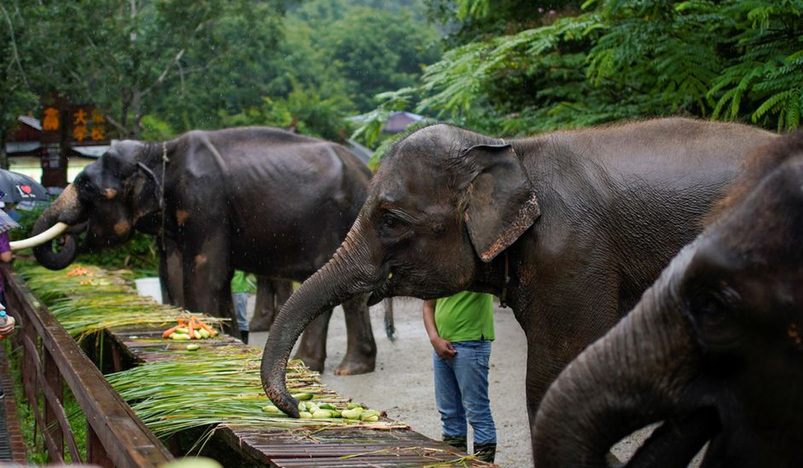
Tourists feed fruit to tamed elephants at the Wild Elephant Valley in Xishuangbanna Dai Autonomous Prefecture, Yunnan Province, China, July 6, 2021. REUTERS/Aly Song
XISHUANGBANNA, China, July 20 - Under a footbridge in southwest China's Yunnan province, a lone female elephant makes a rare appearance at a clearing on the edge of thick forest, ignoring the heavy rain and the gathering crowds to graze and bathe in the chocolate-coloured water.
Usually, visitors hoping to spot the animals should wait until February or March, when the females are seeking mates, said Qin Ganglin, a protection officer at the Wild Elephant Valley in Yunnan's Xishuangbanna region, on the border with Laos and Myanmar.
"They don't come out very often right now, and only sporadically," he said.
Human interactions with the typically elusive elephants have come under fresh scrutiny after a herd of 16 Asian elephants left Xishuangbanna last year, with most of them migrating 500 km (311 miles) north to the outskirts of Yunnan's capital, Kunming, turning them into a media sensation.
How Xishuangbanna protects its elephants and natural ecosystems will also set the tone for China's overall efforts to change its relationship with nature, especially after the emergence of COVID-19 exposed the health risks that arise from habitat destruction.
Xishuangbanna's elephants have more than doubled to about 300 in the past 20 years, a sign of success in rehabilitating herds, and the migrating group was likely seeking more space, especially as the amount of land suitable for them has dwindled by 40% over those two decades.
China's National Forestry and Grassland Commission, which is responsible for habitat protection, did not respond to requests for comment, but state news agency Xinhua said this week that "preparatory work" has already begun to establish a national park in Yunnan to improve conditions for the elephants.
Experts say the move is long overdue.
"We are trying to return them back to their old habitats," said Zhou Jinfeng, Secretary-General of the China Biodiversity Conservation and Green Development Foundation (CBCGDF), a non-government environmental group.
"We think the habitat is not big enough and not good enough and we need to help the elephants find a new one."
A biodiversity hot spot, Xishuangbanna has drawn up "red lines" to separate humans from vulnerable ecosystems. But the expansion of monoculture farming, where fields are dedicated to single crops like tea and rubber, as well as the construction of giant transportation projects in the region, have disrupted the elephants' grazing and roaming routes.
Leave a comment